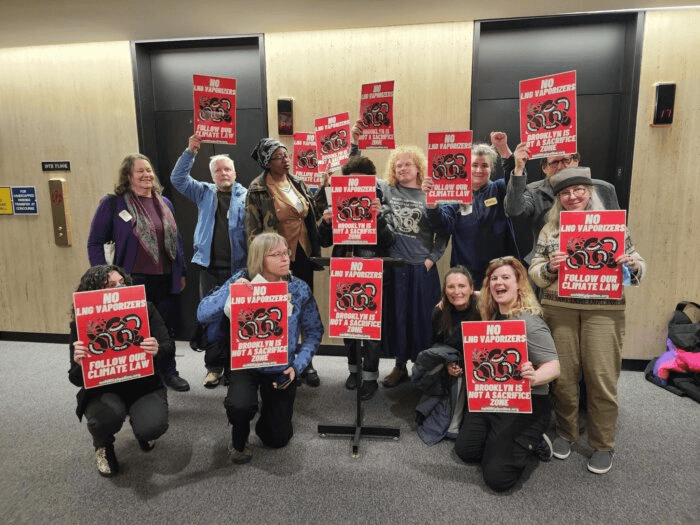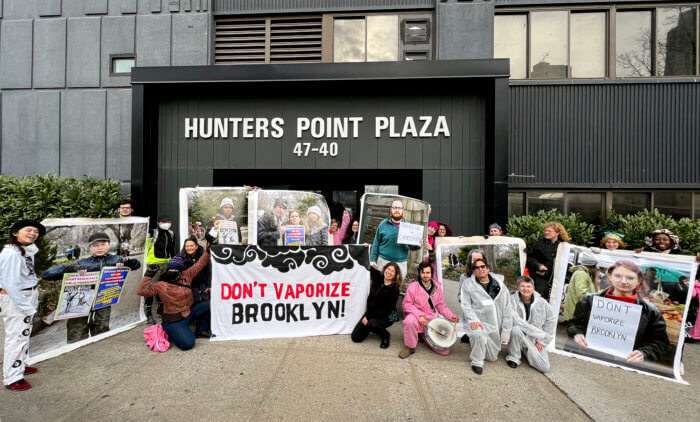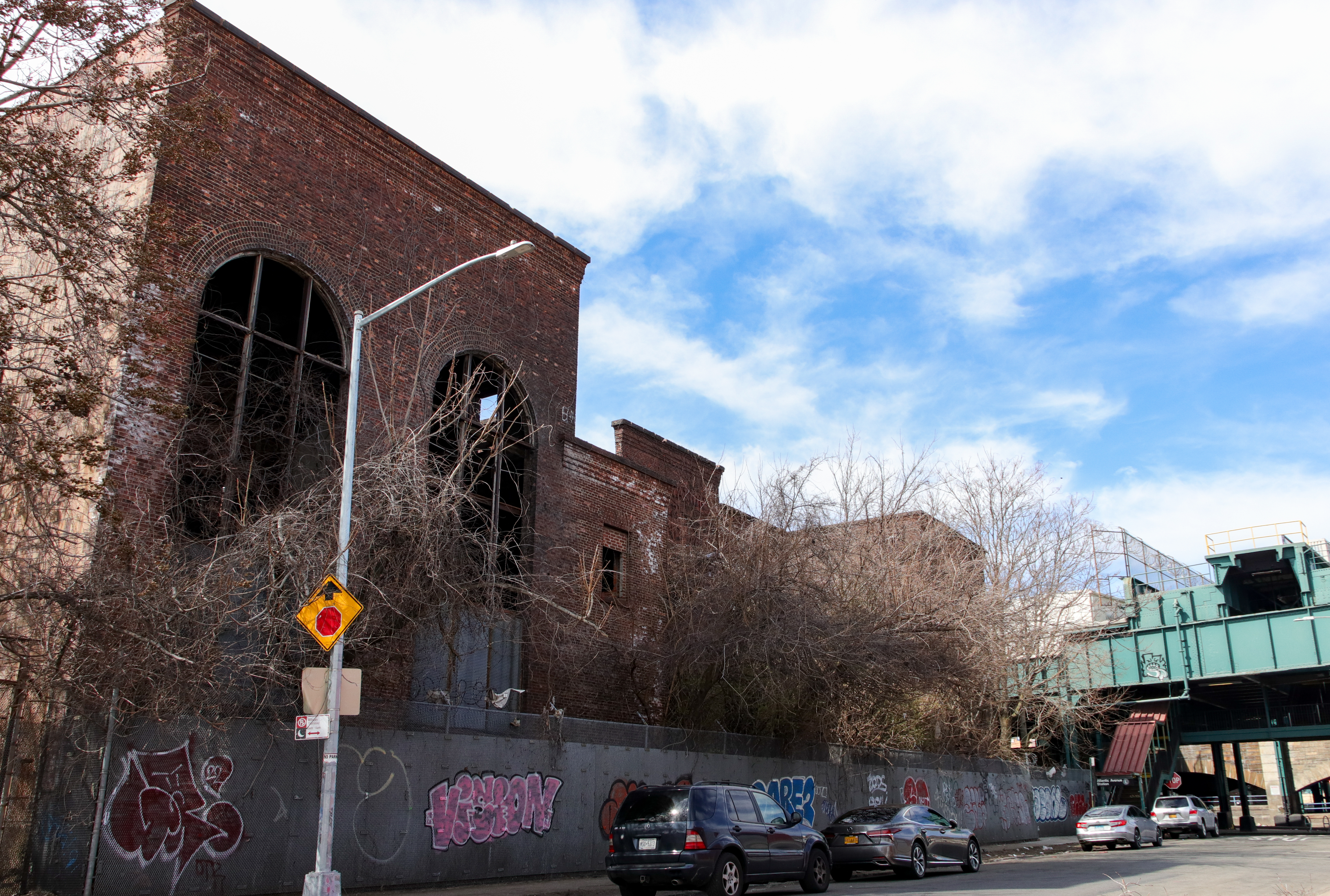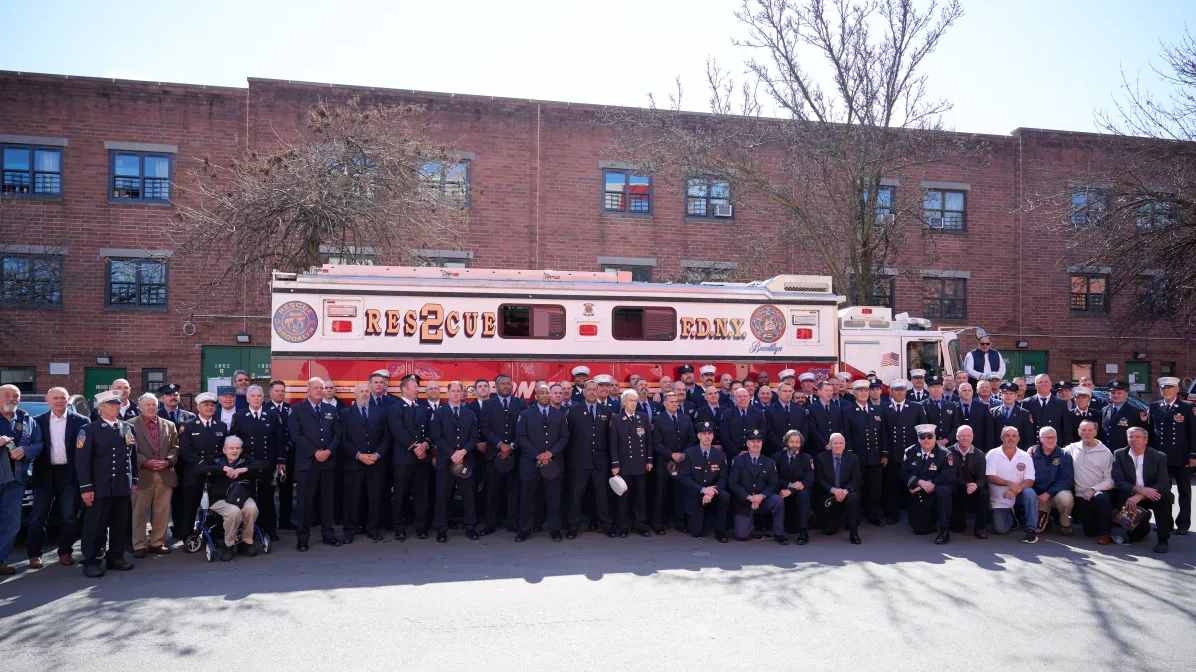State Denies National Grid Petition for Controversial East Williamsburg Vaporizers
The state’s Public Service Commission has denied National Grid’s petition to build two new liquified natural gas vaporizers in East Williamsburg, ruling that the fossil fuel project is unnecessary.

The state’s Public Service Commission has decided that National Grid’s proposed new vaporizers are not currently needed. Photo by Kirstyn Brendlen
The state’s Public Service Commission has denied National Grid’s petition to build two new liquified natural gas vaporizers in East Williamsburg, ruling that the fossil fuel project is unnecessary.
The final decision on the controversial proposal now heads back to the Department of Environmental Conservation, who will determine the ultimate fate of the utility company’s plans.
“While the project has certain reliability benefits, now is not the time to build it,” said PSC Chair Rory M. Christian in a statement. “Instead, now is the time for National Grid to redouble its efforts at energy efficiency and other demand-side management programs to further delay or entirely avoid the need for the project.”
The decision does not necessarily spell the end for the vaporizers, but does mean that National Grid cannot recoup the cost — more than $70 million — of constructing them by raising customer rates at this time. National Grid will be able to petition the PSC again in the future if it feels the project is truly needed.

Before the utility can do anything, though, the DEC must issue its decision on whether or not to grant a less-restrictive air pollution permit that would allow the vaporizers to be built at all.
“We appreciate the New York Public Service Commission’s recognition that the Greenpoint Vaporizers are the best available option to ensure reliable service for our customers; the company is disappointed with the Commission’s determination on the timeline,” said National Grid spokesperson Karen Young.
National Grid has been pushing to build the new vaporizers — which would join a fleet of six older vaporizers at the Greenpoint Energy Center, located at 287 Maspeth Avenue in East Williamsburg — since 2020. The company says the project would not increase gas capacity at the facility, and is necessary to meet future customer demand for natural gas that powers stoves, heaters, and other appliances.
In the 2021 rate hike agreement that allowed National Grid to raise customer’s bills, the PSC noted that the proposed vaporizers could help the company achieve carbon-reduction goals if used in conjunction with other projects, and said that the project would have limited impact on “disproportionately disadvantaged communities” — an assertion locals have disputed.
But, as part of the rate case agreement, new large-scale fossil fuel projects are subject to close scrutiny as the state works to reduce its greenhouse gas emissions.
Such projects would only be approved if the company could demonstrate current, pressing needs that could not be fulfilled by existing infrastructure — and the PSC decided that the vaporizers do not meet those specifications.
“Our community has spent more than three years demanding that state agencies do their job,” said Kim Fraczek, Director of Sane Energy Project, in a statement.“We must take serious action on climate, and prioritize our communities’ health and economies and our ecosystem over the profits of CEO’s and shareholders.”
Breaking down the decision
Thursday’s decision by the PSC was based on a report by PA Consulting and a recommendation compiled by Department of Public Service staff
“Staff recommends that the Commission deny the petition without prejudice at this time based on the finding that Vaporizers 13 and 14 are not needed until at least two years after the timeframe noted in the petition,” said DPS Assistant Counsel Brandon Goodrich.
Vaporizers quickly turn stored liquified natural gas into a vapor, so it can be sent into the system and delivered to customers, and are only used on the coldest days of the year – National Grid frequently only turns on its existing vaporizers for a few days each year.
The 2021 rate case determined that the need for new fossil fuel projects should be determined by “design day demand,” or the demand for natural gas on a day when the average temperature in New York City is 0 degrees Fahrenheit.
The existing vaporizers at the Greenpoint Energy Center are capable of meeting 10.4% of design day demand in Downstate New York, said Chris Stolicky, chief of gas planning and reliability at DPS. Adding new vaporizers would increase capacity to 12.5% of demand.
National Grid projected it will need the new vaporizers to meet demand in the winter of 2026-27, said Chris Stolicky, chief of gas planning and reliability at DPS. In previous reports, National Grid stated that a supply gap could occur without the vaporizers in 2023-24.
However, PA Consulting found that National Grid used outdated demand forecasts in the petition, and failed to include several in-development gas projects that would help meet demand. Taking those factors into account, the firm estimated that the vaporizers would not be needed until at least 2028 — something National Grid said it “strongly disagrees” with.
“My concern is, why did we need to have an independent consultant with our staff find all of these things that were not included?” said Commissioner Tracey A. Edwards. “Why didn’t National Grid provide and include all of this information?”
DPS staff did not have additional conversations with National Grid regarding the petition and the PA report, and did not know why the utility had chosen to omit some information, a staffer said.
It is possible that the vaporizers will be needed after 2027, Stolicky said, something recognized by both the consultant’s report and DPS — but, up to and until that point, National Grid should be working hard to improve energy efficiency and other programs that would bridge the supply gap and possibly nullify the need for the project.
The PSC will allow National Grid to recoup $10.5 million in design and consulting costs via customer rate increases at this time — but not the additional $38.8 million the company has spent on other elements of the project so far.
Commissioners had mixed reactions to DPS’ recommendation to deny the project, though all but one — Diane X. Burman — voted in accordance with it.

Burman said the PA Consulting report was too narrow, and did not take into account the state of gas infrastructure writ large.The system “almost collapsed” due to transmission issues last December, she said.
Freezing temperatures and winter storms caused supply disruptions across the eastern U.S. due to issues with gas pipelines and oil wells. On Christmas Eve, National Grid asked its customers in Brooklyn, Queens, Staten Island and Long Island to cut back on their use of natural gas to help preserve supplies.
The vaporizers “may not have solved this winter’s issue,” Burman said, but could have provided a cushion as supply dwindled.
Some of Burman’s concerns were echoed by commissioners John B. Howard and John B. Maggiore. A demand forecast is an “informed guess,” Howard said, and could be off by a lot — leaving customers without gas on very cold days.
Howard voted to deny the petition “with great trepidation.” The PSC must balance the need to provide steady gas service with the state’s goals to reduce carbon emissions and slow climate change, he said, and does not have clear guidelines for how to navigate doing so.
“I do believe that this order appears to buy us some time, but it doesn’t forestall something that may be needed in the near term,” he said. “Next winter could be horrible, we don’t know. Our Christmas incident could have lasted a week or more, which would have changed the paradigm dramatically.”
Maggiore said the PA Consulting report and National Grid have estimated that the vaporizers can be constructed in about a year and a half once they have full approval — so if they really are needed by the winter of 2028, the utility could approach the PSC again in a few years and still meet that deadline.
Edwards said that given the information National Grid omitted in its first petition, she worries about the prospect of the utility returning to try to resurrect the project. The PSC cannot make a fully-informed decision in any case if they do not have all the necessary information, she said.
“We’re spending so much money, we are trying to balance making sure that we are keeping things moving, and everyone safe, and making sure that we do have reliable service,” Edwards said. “However, we absolutely have to make sure that we are turning this ship, that we are making sure that we are laser-focused on our CLCPA goals.”
“We have to be able to trust each other, and right now, I do not trust [National Grid,]” she continued.
What comes next at the Greenpoint Energy Center
The proposal will now head back to DEC, which plans to issue its decision on air pollution permits within 30 days. Ordinarily, the DEC’s decision would come first – but, last spring, the department chose to suspend its decision-making process as National Grid submitted its permit application “to ensure the Department has all the necessary facts and information to make an informed decision on the pending permit application.”
Locals and activists were frustrated by the delay — DEC had already bumped its decision back several times as it sought additional information from National Grid.
Neighbors and politicians have widely condemned the project, especially because the Greenpoint Energy Center sits in an environmentally-delicate area. Greenpoint is home to two Superfund sites, including the Newtown Creek, which flows directly past the facility, and the public housing development Cooper Park Houses is just across the street.
“With the safety issues and the health issues that this project contains, our community, this community of color, this low-income community, we consider this project to be a race massacre,” said Karen Leader, Cooper Park Resident Council Secretary, at a public hearing on the project last fall.
Council Member Lincoln Restler — who in September introduced a resolution calling on the state to stand against the vaporizers — thanked the PSC for rejecting the petition in a statement on Thursday, saying they “would have increased pollution in our North Brooklyn community, which has long been overburdened by environmental injustices.”
It’s not clear what DEC will decide – though activists were encouraged by the department’s 2021 decision to reject similar permits for large-scale fossil fuel projects in Astoria and Newburgh.
“We applaud the robust public review process the vaporizers have undergone and believe we have made the case that bringing these two state-of-the-art vaporizers online is crucial to maintaining reliable heat and adequate supply for our existing customers, as well as reducing greenhouse gas emissions by replacing older, less efficient equipment,” Young said on behalf of National Grid. “We will review the order and determine the best next steps.”
Editor’s note: A version of this story originally ran in Brooklyn Paper. Click here to see the original story.
Related Stories
- Locals Speak Out Against Rate Hikes to Fund National Grid Gas Vaporizers in East Williamsburg
- State Punts Decision on Controversial Permits for East Williamsburg Energy Facility to Watchdog Org
- Activists Rally to Deny Permit for Gas Vaporizers at National Grid’s Depot in East Williamsburg
Email tips@brownstoner.com with further comments, questions or tips. Follow Brownstoner on Twitter and Instagram, and like us on Facebook.









What's Your Take? Leave a Comment